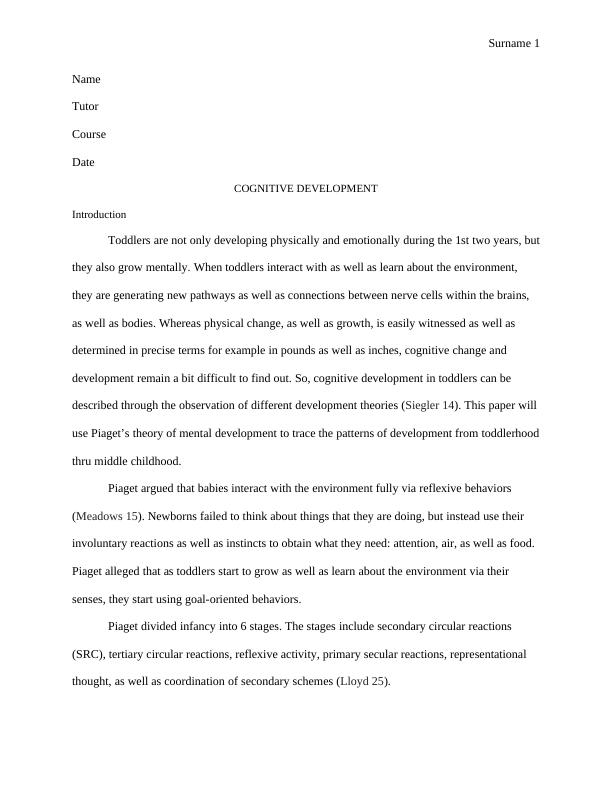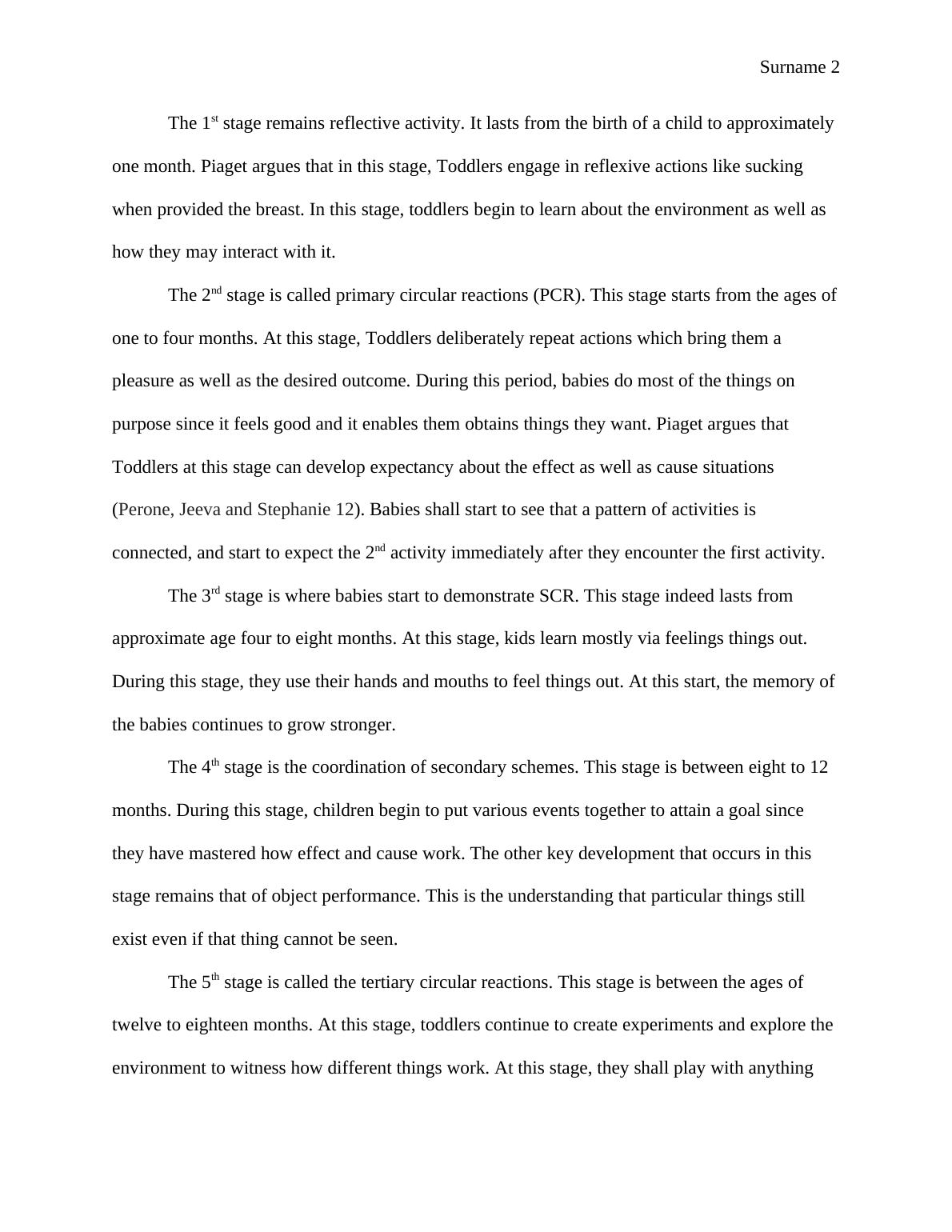Cognitive Developing Physically And Emotionally
Added on 2022-09-07
4 Pages1123 Words86 Views
Surname 1
Name
Tutor
Course
Date
COGNITIVE DEVELOPMENT
Introduction
Toddlers are not only developing physically and emotionally during the 1st two years, but
they also grow mentally. When toddlers interact with as well as learn about the environment,
they are generating new pathways as well as connections between nerve cells within the brains,
as well as bodies. Whereas physical change, as well as growth, is easily witnessed as well as
determined in precise terms for example in pounds as well as inches, cognitive change and
development remain a bit difficult to find out. So, cognitive development in toddlers can be
described through the observation of different development theories (Siegler 14). This paper will
use Piaget’s theory of mental development to trace the patterns of development from toddlerhood
thru middle childhood.
Piaget argued that babies interact with the environment fully via reflexive behaviors
(Meadows 15). Newborns failed to think about things that they are doing, but instead use their
involuntary reactions as well as instincts to obtain what they need: attention, air, as well as food.
Piaget alleged that as toddlers start to grow as well as learn about the environment via their
senses, they start using goal-oriented behaviors.
Piaget divided infancy into 6 stages. The stages include secondary circular reactions
(SRC), tertiary circular reactions, reflexive activity, primary secular reactions, representational
thought, as well as coordination of secondary schemes (Lloyd 25).
Name
Tutor
Course
Date
COGNITIVE DEVELOPMENT
Introduction
Toddlers are not only developing physically and emotionally during the 1st two years, but
they also grow mentally. When toddlers interact with as well as learn about the environment,
they are generating new pathways as well as connections between nerve cells within the brains,
as well as bodies. Whereas physical change, as well as growth, is easily witnessed as well as
determined in precise terms for example in pounds as well as inches, cognitive change and
development remain a bit difficult to find out. So, cognitive development in toddlers can be
described through the observation of different development theories (Siegler 14). This paper will
use Piaget’s theory of mental development to trace the patterns of development from toddlerhood
thru middle childhood.
Piaget argued that babies interact with the environment fully via reflexive behaviors
(Meadows 15). Newborns failed to think about things that they are doing, but instead use their
involuntary reactions as well as instincts to obtain what they need: attention, air, as well as food.
Piaget alleged that as toddlers start to grow as well as learn about the environment via their
senses, they start using goal-oriented behaviors.
Piaget divided infancy into 6 stages. The stages include secondary circular reactions
(SRC), tertiary circular reactions, reflexive activity, primary secular reactions, representational
thought, as well as coordination of secondary schemes (Lloyd 25).

Surname 2
The 1st stage remains reflective activity. It lasts from the birth of a child to approximately
one month. Piaget argues that in this stage, Toddlers engage in reflexive actions like sucking
when provided the breast. In this stage, toddlers begin to learn about the environment as well as
how they may interact with it.
The 2nd stage is called primary circular reactions (PCR). This stage starts from the ages of
one to four months. At this stage, Toddlers deliberately repeat actions which bring them a
pleasure as well as the desired outcome. During this period, babies do most of the things on
purpose since it feels good and it enables them obtains things they want. Piaget argues that
Toddlers at this stage can develop expectancy about the effect as well as cause situations
(Perone, Jeeva and Stephanie 12). Babies shall start to see that a pattern of activities is
connected, and start to expect the 2nd activity immediately after they encounter the first activity.
The 3rd stage is where babies start to demonstrate SCR. This stage indeed lasts from
approximate age four to eight months. At this stage, kids learn mostly via feelings things out.
During this stage, they use their hands and mouths to feel things out. At this start, the memory of
the babies continues to grow stronger.
The 4th stage is the coordination of secondary schemes. This stage is between eight to 12
months. During this stage, children begin to put various events together to attain a goal since
they have mastered how effect and cause work. The other key development that occurs in this
stage remains that of object performance. This is the understanding that particular things still
exist even if that thing cannot be seen.
The 5th stage is called the tertiary circular reactions. This stage is between the ages of
twelve to eighteen months. At this stage, toddlers continue to create experiments and explore the
environment to witness how different things work. At this stage, they shall play with anything
The 1st stage remains reflective activity. It lasts from the birth of a child to approximately
one month. Piaget argues that in this stage, Toddlers engage in reflexive actions like sucking
when provided the breast. In this stage, toddlers begin to learn about the environment as well as
how they may interact with it.
The 2nd stage is called primary circular reactions (PCR). This stage starts from the ages of
one to four months. At this stage, Toddlers deliberately repeat actions which bring them a
pleasure as well as the desired outcome. During this period, babies do most of the things on
purpose since it feels good and it enables them obtains things they want. Piaget argues that
Toddlers at this stage can develop expectancy about the effect as well as cause situations
(Perone, Jeeva and Stephanie 12). Babies shall start to see that a pattern of activities is
connected, and start to expect the 2nd activity immediately after they encounter the first activity.
The 3rd stage is where babies start to demonstrate SCR. This stage indeed lasts from
approximate age four to eight months. At this stage, kids learn mostly via feelings things out.
During this stage, they use their hands and mouths to feel things out. At this start, the memory of
the babies continues to grow stronger.
The 4th stage is the coordination of secondary schemes. This stage is between eight to 12
months. During this stage, children begin to put various events together to attain a goal since
they have mastered how effect and cause work. The other key development that occurs in this
stage remains that of object performance. This is the understanding that particular things still
exist even if that thing cannot be seen.
The 5th stage is called the tertiary circular reactions. This stage is between the ages of
twelve to eighteen months. At this stage, toddlers continue to create experiments and explore the
environment to witness how different things work. At this stage, they shall play with anything

End of preview
Want to access all the pages? Upload your documents or become a member.
Related Documents
Virtual Child Development Research Paper 2022lg...
|8
|2184
|34
Child Development | Essay-1lg...
|7
|1974
|150
Cognitive Development in Infancy: Impact on Healthcare and Role of Practitionerslg...
|8
|1948
|58
Physical Development Experiences for Children of Different Age Groupslg...
|13
|3094
|120
CHCECE005 Assessment 2 Question 1lg...
|5
|1176
|98
Case Study Of Child Developmentlg...
|4
|536
|18